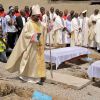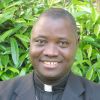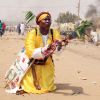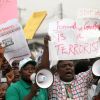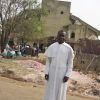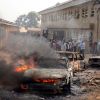Archbishop challenges Nigerians to keep nation united
ABUJA, Nigeria - Archbishop John Olorunfemi Onaiyekan of Abuja challenged Nigerians to do everything possible keep their nation united and to resist any attempts to divide it along narrow religious lines.
"We live in a nation where everyone is supposed to be free to profess whatever faith he or she decides to follow," Archbishop Onaiyekan said in his homily at the opening Mass of the Nigerian bishops' plenary Feb. 26.
MADALLA, Nigeria - Officials of the Archdiocese of Abuja celebrated Mass for 18 victims of the Christmas bombings at St. Theresa Catholic Church, then buried the remains within the church grounds.
Abuja Archbishop John Olorunfemi Onaiyekan told about 2,000 people gathered at the church Feb. 1 that "those who killed others, either in the name of their faith or ideology, are murderers.''
Nigerian bishops deplore fatal attacks in North by Islamic group
VATICAN CITY - Two Nigerian bishops deplored bloody attacks in a northern city by a radical Islamist group, warning of deep social divisions and displaced populations, the Vatican missionary news agency Fides reported.
"They are destroying the hope of a united Nigeria," said Archbishop Ignatius Ayau Kaigama of Jos, referring to simultaneous attacks on government buildings by the extremist sect known as Boko Haram, Jan. 20 in the city of Kano, according to Fides.
News reports said that more than 150 people, most of them Muslims, are believed dead following the attacks, the latest in a series by the radical organization, which seeks to impose Islamic law in the country's Muslim-majority North.
Nigerian bishops call for negotiated end to nationwide strike
LAGOS, Nigeria - The Catholic Bishops' Conference of Nigeria called on the Nigerian government and organized labor to negotiate a settlement to a crippling nationwide strike.
The bishops expressed concern Jan. 12 that "things seem to be deteriorating by the day" as the country endured the fifth day of a work stoppage that at times erupted into violence.
A union representing 20,000 oil and gas workers threatened to shut down all production starting Jan. 15 to join the strike.
The strike began Jan. 9, a week after the government ended a fuel subsidy. Pump prices shot up by as much as 300 percent overnight, leading to higher prices for consumer goods and services.
A meeting between Nigerian President Goodluck Jonathan and leaders of the Nigerian Labor Congress and the Trade Union Congress late Jan. 11 failed to resolve the impasse. Another meeting was scheduled for Jan. 13.
Archbishop Felix Alaba Job of Ibadan, conference president, signed the statement, which called for the parties to use restraint and to take steps to return the country to normal activities.
"All parties claim that they have the welfare of the poor in mind, but as we can see, it is actually the poor who are caught in the crossfire," the bishops said.
The bishops condemned the violence that erupted during the strike. They said they were concerned that the strike had been "hijacked by rogues, hoodlums and persons that have other interests apart from the nation's in mind."
"What started out as an expression of our democratic right and the opportunity for ordinary people to make inputs into policy affecting them has unfortunately turned rather ugly and is looking like the dialogue of the deaf," the statement said.
While the bishops said they support removal of the fuel subsidy, they suggested that it might be reinstated in part and then implemented in stages to lessen the impact on average Nigerians.
The bishops also commended the move by Jonathan to cut salaries of elected officers and political appointees by 25 percent. "But we think it is not enough," they said.
"We think this is the time Mr. President can cut corruption from the roots by ordering massive cuts in the fringe benefits that are even above the salaries -- sitting, travel, hospitality and all forms of allowances that make politicians and government officials financial overlords on the poor citizens," the statement said.
LAGOS, Nigeria - A group of Nigerian bishops accused the government of selfishness, collusion and fraud and said removal of a fuel subsidy showed "insensitive timing."
"Must the poor suffer to make the rich smile? It may not be fair to blame the ... government alone for all the woes of Nigeria, but this government must take full responsibility for the insensitive timing and execution of this policy on fuel subsidy," said the statement, signed by Archbishop Felix Alaba Job of Ibadan, president of the Ibadan Ecclesiastical Province of the Catholic Bishops' Conference of Nigeria.
Nigeria’s Christmas a day of tears and sorrow
ABUJA, NIGERIA - Christmas was a day of joy but also a day of tears and sorrow for Nigerian Christians. As the world celebrated the birth of the Prince of Peace, the Nigerian Church was struck by senseless violence that wiped away entire families and slaughtered scores of worshippers at three churches: St. Theresa’s parish in the town of Madalla, the Mountain of Fire and Miracles Church in Jos, and the church in Gadaka.
I could have been among the victims but for divine providence. Until last April, when I was appointed as an assistant chaplain at the University of Abuja, I did weekend pastoral ministry at St. Theresa’s parish. But for that appointment I would have been in St. Theresa’s on Christmas day.
Religion a core value
The Christmas morning bomb attacks on Nigerian churches that killed dozens of worshippers underscores why the Stephen Harper government cannot act soon enough to establish an Office of Religious Freedom.
Its creation was promised during last spring’s federal election and, under Foreign Minister John Baird, consultations began in October to set parameters for the new department. The Minister has promised details in coming weeks but, as yet, has not announced an opening date for the new office. Horrors like the carnage in Nigeria should spur him to keep this initiative on a government front burner.
Nigerian bishops urge government to get control after church bombings
LAGOS, Nigeria - Catholic leaders condemned the spate of bomb blasts in Nigeria and urged the government to get control of security.
Lagos Cardinal Anthony Olubunmi Okogie criticized the government for its failure to protect citizens.
Speaking at the dedication of St. Peter Church in Awka, the cardinal said the spate of bombings in a four-day period makes people wonder "what the government is doing with our money. If they cannot protect the lives of its citizens, then why do we have a government?"
Pope condemns Christmas bombings in Nigeria
VATICAN CITY - Pope Benedict XVI appealed for an end to violence in Nigeria, condemning the Christmas church bombings that led to the deaths of at least 39 people.
The celebration of Christmas leads people to pray in an even stronger way that God would "stop the hands of the violent who sow death and that justice and peace would reign in the world," the Pope said Dec. 26 as he recited the Angelus with visitors gathered in St. Peter's Square.
A group called Boko Haram, which has been promoting the adoption of Islamic law across Nigeria, claimed responsibility for the bombings. News reports said at least 35 people died at St. Theresa Catholic Church in Madalla, just outside Abuja. Other deadly bombs were set off at the Mountain of Fire and Miracles Church in Jos and at police stations in three other cities.
Nigerian Christmas is defined by faith, family
“Are you coming home for Christmas?”
“No, Uncle Buga, not this time.”
“Do you realize,” he said to me sounding emotional, “that you have not been home for Christmas since you left the country?”


